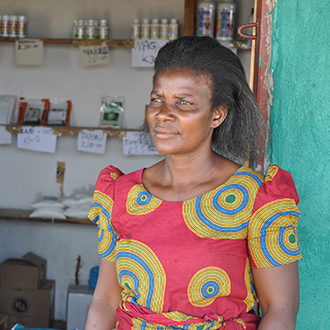Dorica Zulu Nkoma welcomes visitors to her store with a warm and generous smile. The 43-year-old entrepreneur is a mother and grandmother. She runs an agro-business in Kafumbwe, a village in the Katete district of Zambia’s Eastern Province. Her store sits at the intersection of the Great East Road, which links the agricultural hub of Katete with Mozambique, and a small dirt road that leads to Kafumbwe Primary School.
Residents of Kafumbwe are mostly subsistence farmers. Periods of drought can leave residents vulnerable. Dorica sells seed and fertilizer to boost local agricultural development, which helps people in the community to reliably produce and improve crop yields, enabling them to earn more money.
Wearing a vibrant, multi-colored dress and chitambala, a traditional head scarf, Dorica holds her grandchild to her chest as she talks of losing her youngest daughter to malaria in 2001. The little girl had not yet turned 2.
“My [oldest] daughter called me to say my child was sick. When I touched her, the body was very hot, and she looked weak and very ill.” She pauses and sinks a bit in her seat as she recalls that night when her daughter, racked with fever, began convulsing. At the time, she thought that the girl was bewitched. But in fact, she was suffering from severe malaria.
“My husband and I agreed we should go to the clinic located about 8 kilometers from our village. We got on the bicycle headed for the clinic, but we got a flat tire. So we walked. By this time the clinic had already closed as it was late evening.” Dorica bought medicine, but her daughter did not improve. She returned the next day and was referred to the hospital, which was 40 kilometers away. It was too late to travel by bicycle, and Dorica had no other means of transportation.
The next morning, 2 days after her daughter began convulsing, they traveled by bicycle to the hospital. When they arrived, they encountered long lines. After waiting for hours, her daughter was finally admitted. Suffering from severe malaria and anemia, she was injected with fluids to counter dehydration and given medicine, but it was too late. Her daughter did not improve, and shortly later, she succumbed to the disease. Dorica biked back to Kalinde, engulfed in sadness. She and her husband were devastated to lose their child at such a young age. “A lot of people lost their lives because of lack of transport in those days. Even the [rapid diagnostic] testing kits weren’t readily available.”
In 2002, malaria was the leading killer in Zambia, especially of young children. Zambia was selected as a U.S. President’s Malaria Initiative (PMI) focus country in 2007. Since then, PMI has been working with Zambia’s National Malaria Control Program and other partners to scale up malaria prevention tools, such as insecticide-treated mosquito nets (ITNs), indoor residual spraying (IRS), and preventative treatment for pregnant women (IPTp), and to increase the availability of malaria diagnosis and effective treatment.
Today, Dorica and her grandchildren sleep under ITNs, and her home has been sprayed. When Dorica and her husband experienced malaria symptoms earlier this year, they were tested and treated right in their own village. Her grandchildren have not suffered from malaria at all.
“When I look at our way of life now, I see a lot of improvements; there are fewer diseases and deaths. Months go by without any family member getting sick. When there is sickness in the family, no one can be happy or dance.
“Today, my children and grandchildren are fine. There is no more sickness. My husband is in good health. We are working, and our business is going well. This is enough reason to sing and dance.”

